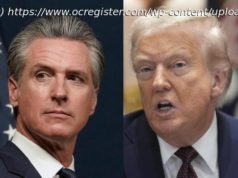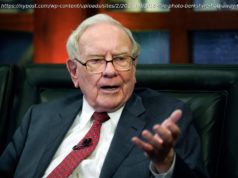There’s still time to learn but the clock is ticking.
It’s not entirely clear what President Donald Trump wants out of his trade war against China (and the rest of the world, for that matter), but one theory is that he thinks his tariffs will hurt so badly that Beijing will have to cede to his demands ( whatever those are), helping U. S. trade while also firing up his base ahead of the midterms.
Michael Schuman argues this approach misunderstands a lot about China. First, the tariffs won’t hurt it that badly. Second, the tariffs won’t hurt just China – they’ll also hurt foreign companies, including Americans (and that’s before we even start talking about retaliation). Finally, they’ll only make Xi Jinping dig in his heels more. After all, he has a political base too. Click here to read the whole thing.
Another Trump misconception ahead of the trade wars was that nobody would retaliate, writes Ramesh Ponnuru. This belief – part of the idea that trade wars are easy to win – is one of four “new rules” (some might call them “fundamental misunderstandings”) Trump followed going into his trade wars. The other three are: 1) inflict pain on your own companies and consumers; 2) fight every country at once; and 3) keep your demands unclear. Click here to read the whole column.
Former WTO chief judge James Bacchus suggests Trump is right to complain about China’s “Made in China 2025” drive, which just looks like more protectionism. He argues China would be more likely to achieve its goals by following the rules. But James, like Michael, notes the West has exploited and cheated China for a very long time. That might help explain not only why China breaks the West’s rules but also why it won’t buckle to Trump.
More on Trump and Trade:
Trump’s UK visit has been pretty stressful. For one thing, there’s that blimp. Then in a Sun interview, he trashed Prime Minister Theresa May’s Brexit plan, praised her rival Boris Johnson and warned the UK and U. S. might not cut a bilateral trade deal. Then he took all that back and called the (taped) Sun interview “fake news.” Fortunately, he gets to unwind this weekend, at U. S. and U. K.taxpayer expense, at his Turnberry golf course in Scotland. Owning that course has not been a stress-free experience either, though, as Tim O’Brien lays out in the first of two columns:
“Turnberry appears to have largely lost piles of money. That makes it a lesson in the strengths and weaknesses of the president’s instinctive and haphazard approach to business and politics, reminders of longstanding problems that have dogged him throughout his career, including financial conflicts of interest that have taken on new traction with his ascent to the White House.”
Click here to read the rest .
The Justice Department last night, after a month’s delay, said it would appeal a judge’s approval of the AT&T Inc./Time Warner Inc. merger. Tara Lachapelle points out a couple of minor problems with this: First, the Trump administration was woefully unprepared to prosecute this case the first time around, and she doubts it’s gotten its act together yet. Second, the merger has basically already happened! And it opened the floodgate to a whole host of other deals, as you can see in this mind-blowing chart:
You can’t get in the way of that wheel! Click here to read Tara’s column.
Matt Levine weighs in on this, too, saying the Justice Department had its shot and blew it.
Hooray, it’s corporate earnings season! Time for some profit clarity that will help the stock market cut through the trade-war noise, right? Sadly, no, writes Robert Burgess, pointing to two early quarterly reports that exemplify the push-pull the market has been suffering for a while now. It may well keep suffering all through earnings season. Click here to read his market wrap-up piece, a daily feature of Bloomberg Opinion.
Noah Smith has eight charts that show how America’s been doing so far in this century. Here’s a clue – not so great:
JPMorgan Chase & Co.’s latest quarterly results were strong, but interest rates are a threat to CEO Jamie Dimon’s promise of a “golden age” for banking, writes Stephen Gandel:
Yesterday’s Peter Strzok hearing/circus was the latest episode of Republicans making a mockery of Congress’ oversight role. – Jonathan Bernstein
Don’t expect much to come from the Trump-Putin summit . – Leonid Bershidsky
Theresa May’s Brexit plan leaves UK banking in the dark . – Ferdinando Giugliano
It will take more than just economic sanctions to topple Iran’s regime. – Hussein Ibish
Cars are big rolling computers now, but automakers still haven’t gotten them right . – Nathaniel Bullard (from his Sparklines newsletter)
Trump had tea with the Queen. Just ahead of Trump’s Putin summit, Robert Mueller indicted 12 Russians, accusing them of hacking the Democrats in 2016. China’s ZTE is free to do business with Americans again.
Hungary v. West Germany in 1954 was the most important soccer game ever played.
There may not really be « hot streaks” in sports, but there are in arts and science . – Faye Flam
Planning your own British vacation? Here’s a literary map of the UK .
Science says get out of your dead-end relationship .
WeWork Cos. says it won’t pay for its employees to eat meat any more.
20-foot-tall rice could feed a flooded planet.
The Atlantic’s photos of the week .
Note: Please send rice, suggestions and kicker ideas to Mark Gongloff at mgongloff1@bloomberg.net.
***
New subscribers can sign up here .
Like Bloomberg Opinion Today? Subscribe to Bloomberg All Access and get much, much more. You’ll receive our unmatched global news coverage and two in-depth daily newsletters, The Bloomberg Open and The Bloomberg Close.
To contact the author of this story: Mark Gongloff at mgongloff1@bloomberg.net
To contact the editor responsible for this story: Timothy L. O’Brien at tobrien46@bloomberg.net






